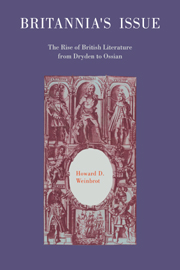Book contents
- Frontmatter
- Contents
- Acknowledgments and editorial notes
- INTRODUCTION: An overview of scope and method
- PART I CONTEXTS: INTELLECTUAL, PSYCHOLOGICAL, AND NATIONAL
- PART II TEXTS WITHIN CONTEXTS. ESSAYING ENGLAND: OUR GENIUS, OUR CLIME
- PART III GROWING ONE'S OWN. THE BRITISH ODE FROM COWLEY TO GRAY
- PART IV EXPANDING THE BORDERS. JEWS AND JESUS: THIS ISRAEL, THIS ENGLAND
- PART V CELTS, GERMANS, AND SCOTS: TOWARDS A UNITED KINGDOM
- Prologue to Part V
- 13 CELTIC SCOTLAND
- 14 OSSIAN IN SCOTLAND, GREAT BRITAIN, AND MODERN EUROPE: JOINING BRITANNIA'S ISSUE
- 15 CONCLUSION. SYNTHESIZING ALL THE NATIONS UNDER HEAVEN
- APPENDIX: The text of Handel's “Israel in Egypt”
- Index
13 - CELTIC SCOTLAND
Published online by Cambridge University Press: 15 December 2009
- Frontmatter
- Contents
- Acknowledgments and editorial notes
- INTRODUCTION: An overview of scope and method
- PART I CONTEXTS: INTELLECTUAL, PSYCHOLOGICAL, AND NATIONAL
- PART II TEXTS WITHIN CONTEXTS. ESSAYING ENGLAND: OUR GENIUS, OUR CLIME
- PART III GROWING ONE'S OWN. THE BRITISH ODE FROM COWLEY TO GRAY
- PART IV EXPANDING THE BORDERS. JEWS AND JESUS: THIS ISRAEL, THIS ENGLAND
- PART V CELTS, GERMANS, AND SCOTS: TOWARDS A UNITED KINGDOM
- Prologue to Part V
- 13 CELTIC SCOTLAND
- 14 OSSIAN IN SCOTLAND, GREAT BRITAIN, AND MODERN EUROPE: JOINING BRITANNIA'S ISSUE
- 15 CONCLUSION. SYNTHESIZING ALL THE NATIONS UNDER HEAVEN
- APPENDIX: The text of Handel's “Israel in Egypt”
- Index
Summary
In 1787 John Pinkerton complains that “this may be called the Celtic Century, for all Europe has been inundated with nonsense about the Celts.” Pinkerton's characteristic virulence here responds to a major strain of eighteenth-century ethnography. Such Celtomania includes varied achievements, times, and countries.
In 1703 Paul Pezron enthuses that by 2,000 BC “It is not to be conceived what great and extraordinary Things [the Celts] performed under this Name” of Titans. The Celtic empire nearly equalled “that of Rome.” By 1769 Rowland Jones is even less restrained, and extends Celtic linguistic eminence beyond that of its classical competitors. In The Philosophy of Words he claims that “we can afford to abolish three fourths of our vocables; retaining only those of our own original CELTIC growth, which far exceed those of the Greeks and Romans, as to natural and original expressions.”
Others praise the nearer Celtic past. John Smith's Galic Antiquities (1780) characterizes some of the charms of that strong but gentle society. The “humble, but happy [Highland] vassal, sat at his ease” near his favorite rock or tree. He had few wants and fewer cares, “for he beheld his herds, sporting around him on his then unmeasured mountains. He hummed the careless song, and tuned his harp with joy, while his soul in silence blessed his chieftain.” Modern Scottish success was more immediate than outmoded pastoral foolishness. In 1794 the Reverend John Lanne Buchanan responds temperately to Pinkerton's disgusting racist attacks upon Celts. Pinkerton, he says, insults a brave people who now excel “either in the pulpit, at the bar, or on military expeditions, and the province of physic and history is in a manner given up to them.”
- Type
- Chapter
- Information
- Britannia's IssueThe Rise of British Literature from Dryden to Ossian, pp. 481 - 525Publisher: Cambridge University PressPrint publication year: 1993



